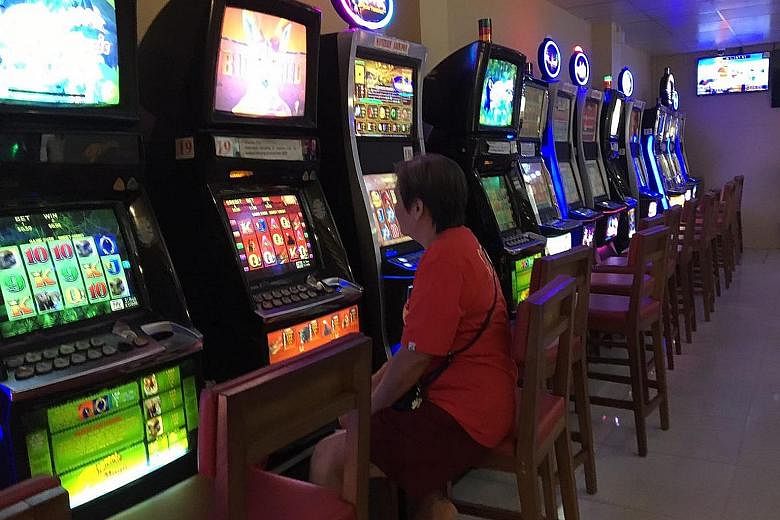They are two local football clubs that are trying to rejoin the professional S-League ranks, but that dream is now more distant with the Ministry of Home Affairs (MHA) set to wind down their money-spinning jackpot rooms.
Gombak United and Tanjong Pagar United are two of seven clubs that have been told by the ministry to cease their jackpot operations by the end of next April. There are 82 clubs with fruit machines, and a fifth of them have failed to meet MHA's revised guidelines on such facilities announced in July.
For Gombak chairman John Yap, the loss of the jackpot licence could mean the end of the Bulls' bid to play S-League football again. The club has sat out the professional competition since 2013.
Mr Yap, whose club operates 22 machines at the Kitchener Road premises, said: "If the authorities stick to their decision, we will lose our biggest revenue stream, and it will be impossible for us to return to football.
"All the hard work over the last few years is not recognised.
"We suffered by putting in our own money to keep the club afloat while we were in the league. We suffered to revise our business model to pay back our football-related debts. We suffered when we got kicked out of our premises last year. We suffered going through stringent audits, and we suffered to put things together again.
"Never mind that our efforts weren't appreciated, but we are misunderstood."
In July, MHA mandated that a club will be allowed to operate jackpot rooms only if it provides at least two other recreational facilities such as karaoke, a gym or swimming pool, to align clubhouses closer to their main purpose of offering recreational and social activities.
Membership rules will also be strongly regulated, with entry to the jackpot rooms restricted to individuals aged 21 and above who hold a membership of at least one year.
Members are also not allowed to take guests into the jackpot rooms, whose operating hours will be between 10am and 11pm.
The quota of jackpot machines, which was 1,900 in 82 clubs at the time of the announcement, will also be reduced over the next two years.
Clubs that do not meet the criteria will have to cease their jackpot operations by April 30 next year.
The new regulations were rolled out to protect people from the dangers of gambling.
Tanjong Pagar United chairman Edward Liu, who was informed of MHA's decision on Oct 27, had targeted 2018 as the season for the Jaguars to make their S-League return after sitting out since 2015.
He has since written to both MHA and the Football Association of Singapore to appeal against the decision. "It will be very, very difficult to come back if the authorities deem that we do not meet these enhanced requirements," he said.
"Tanjong Pagar are always committed to playing football. We have fielded a team in the Women's Premier League. We train 40 kids from the Tanglin School in our outreach programme, and we are actively coaching the grassroots in our CDC (community development council). And we were one of the pioneer members of the S-League (in 1996)."
Mr Liu said that the club needed at least $1 million a year "to field a decent team" in the S-League. Local professional clubs previously received $800,000 in subsidies from the Tote Board. Mr Liu said his club has 18 jackpot machines which generate another $250,000 to $300,000 annually.
It is understood that another sit-out S-League club, Woodlands Wellington, has also ceased jackpot operations in Prinsep Street, although the reasons are unknown. The club could not be reached for comment.
Mr Yap added that the tough new rules will have an adverse effect on the struggling S-League.
He lamented: "There have been big calls to restructure the league, and clubs like us are ready to answer the call to help what is a depleted football landscape.
"The league authorities have already decided the S-League is not commercially viable. And taking this move has taken out a big component of revenue that can help the football landscape. I think there should be some leniency exercised."
• Additional reporting by Shamir Osman


